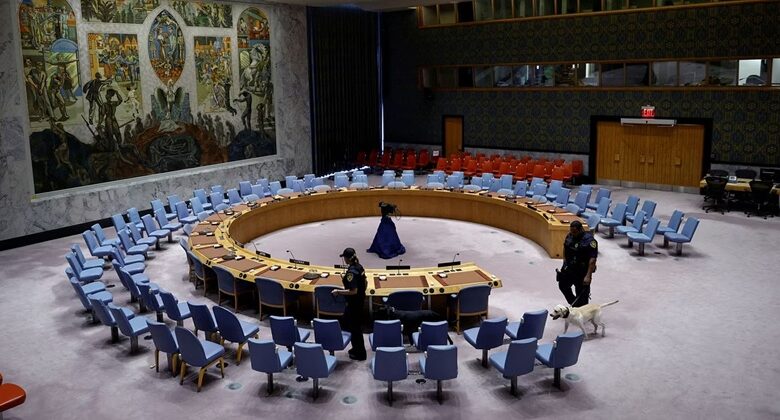UN Security Council adopts neutral US stance on war in Ukraine as Trump pursues end to conflict
News Mania Desk / Piyal Chatterjee / 25th February 2025

On Monday, the United Nations Security Council approved a resolution drafted by the U.S. marking the third anniversary of Russia’s invasion of Ukraine, which maintains a neutral stance on the conflict as U.S. President Donald Trump attempts to mediate a resolution to the war. The brief resolution illustrates Trump’s disruption of U.S. policy on Ukraine following his inauguration last month and his softer approach towards Russia. In comparison, the administration of former president Joe Biden spearheaded initiatives at the United Nations to assist Ukraine during the conflict.
Russia’s U.N. Ambassador Vassily Nebenzia recognized “positive developments” in the U.S. stance regarding the conflict. He informed the council that the resolution was “not the best option,” but rather “a beginning for future attempts at a peaceful resolution.” The 15-member U.N. Security Council was paralyzed during the war and unable to act due to Russia’s veto power.
However, the 193-member General Assembly has consistently backed Ukraine’s sovereignty and territorial integrity, advocating for a fair, enduring, and comprehensive peace in accordance with the U.N. Charter. Earlier on Monday, the U.S. was unsuccessful in persuading the General Assembly to approve the identical three-paragraph resolution that the Security Council had adopted.
The resolution expresses sorrow over the loss of life in the “Russia-Ukraine conflict,” emphasizes that the U.N.’s mission is to preserve global peace and security and resolve disputes peacefully, and calls for a prompt conclusion to the conflict and enduring peace. Resolutions from the Security Council are regarded as binding, whereas resolutions from the General Assembly are not. Nevertheless, resolutions from the General Assembly hold political significance, representing an international perspective on the conflict.
The U.S. resolution was approved by the Security Council with 10 votes supporting it, while France, Britain, Denmark, Greece, and Slovenia chose to abstain. Russia supported the vote after being unable to modify it and blocking European attempts to include language that backed Ukraine. “This resolution puts us on the path to peace. It is a first step, but a crucial one – one of which we should all be proud,” acting U.S. Ambassador to the U.N. Dorothy Shea told the council. “Now we must use it to build a peaceful future for Ukraine, Russia and the international community.”
Nonetheless, Trump’s method of mediation has made Ukraine and European partners cautious about his emphasis on Russia and anxious they might be sidelined in discussions to resolve the conflict. Britain’s U.N. Representative Barbara Woodward informed the council that the peace conditions in Ukraine are significant and should “convey a message that aggression has consequences.”
French U.N. Ambassador Nicolas de Riviere – whose President Emmanuel Macron met with Trump in Washington on Monday – stated that although France is “deeply dedicated to peace in Ukraine, we advocate for a complete, fair, and enduring peace, and definitely not for the surrender of the victim.” The General Assembly previously approved two resolutions, one created by Ukraine and European nations and another by the U.S., which was modified by the assembly to incorporate its longstanding language in support of Ukraine. Those votes provided Ukraine and European nations a diplomatic triumph over Washington.
“This conflict has never solely revolved around Ukraine.” “It is a basic right for any nation to exist, to determine its own course, and to live without aggression,” stated Ukraine’s Deputy Foreign Minister Mariana Betsa to the assembly prior to the vote. The revised resolution drafted by the U.S. received 93 votes in favor from the assembly, while 73 countries abstained and eight opposed. Russia’s attempt to modify the U.S. text to refer to the “root causes” of the conflict was unsuccessful. The resolution created by Ukraine and European nations was approved with 93 votes for, 65 abstentions, and 18 votes against.






